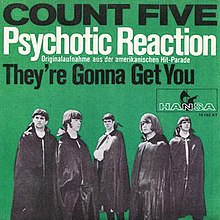Psychotic Reaction
| "Psychotic Reaction" | ||||
|---|---|---|---|---|
 |
||||
| Single by Count Five | ||||
| from the album Psychotic Reaction | ||||
| B-side | "They're Gonna Get You" | |||
| Released | June 1966 | |||
| Format | 7" single | |||
| Recorded | 1965 | |||
| Studio | Hollywood, California | |||
| Genre | ||||
| Length | 2:56 | |||
| Label | Double Shot | |||
| Songwriter(s) |
|
|||
| Producer(s) |
|
|||
| Count Five singles chronology | ||||
|
||||
| Audio sample | ||||
|
|
||||
"Psychotic Reaction" is a song by the American garage rock band Count Five, released in June 1966 on their debut studio album of the same name. It peaked at No. 5 on the Billboard Hot 100, and was among the first successful acid (or psychedelic) rock songs, containing the characteristics that would come to define acid rock: the use of feedback and distortion replacing early rock music's more melodic electric guitars.
The song was included in the Rock and Roll Hall of Fame's list of the "500 Songs That Shaped Rock and Roll". In 2014, the song placed seventh on Paste's list of the "50 Best Garage Rock Songs of All Time".
In late 1964, Irish-born guitarist John "Sean" Byrne was sitting in a Health Education class in his freshman year at San Jose City College in California, learning about psychosis and neurosis. His friend Ron Lamb leaned over and whispered: "You know what would be a great name for a song? Psychotic Reaction!". Byrne had been writing a tune in his head that day, and used the title to finish it, with the entire band given writing credit.
According to an interview with Byrne, the rave-up solo section of the song was influenced by the Yardbirds' frenzied 1965 treatment of Bo Diddley's R&B classic "I'm A Man", while the rest of the song was contributed by the band.
When Count Five, managed by singer Kenn Ellner's dad, Sol Ellner, a successful South Bay insurance salesman, played the song live a few weeks later at a dance at the old West Valley College in Campbell, local KLIV radio disc jockey Brian Lord, emceeing the show, was very impressed. After a few pointed suggestions on rearranging the tune for even more punch, Lord soon put the band in touch with a couple of friends in Los Angeles, Hal Winn and Joe Hooven, about to start their own record label, Double Shot Records.
...
Wikipedia
